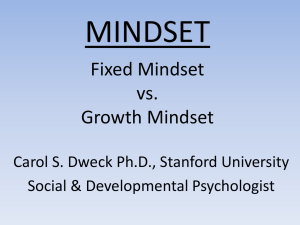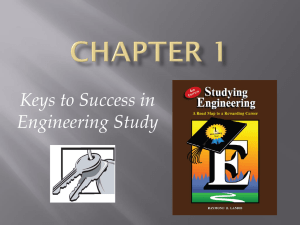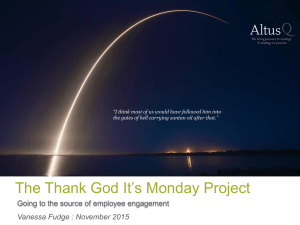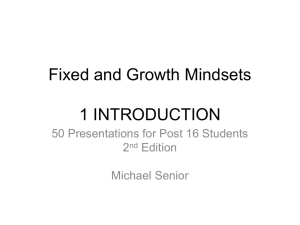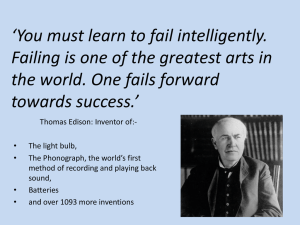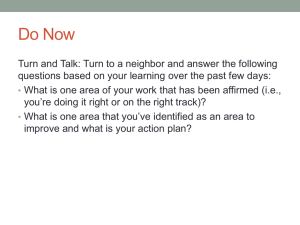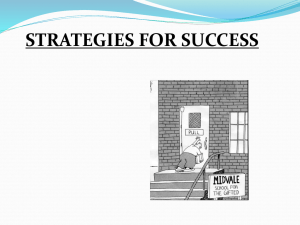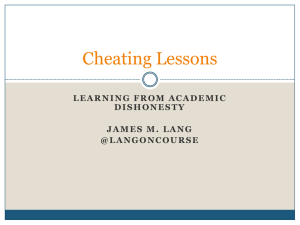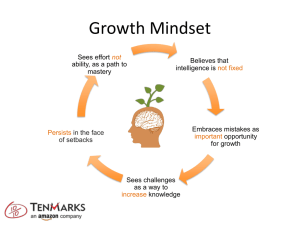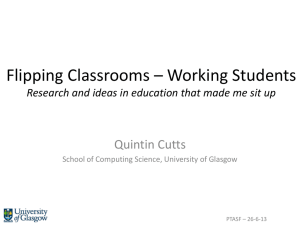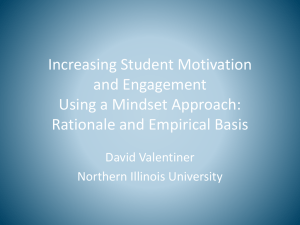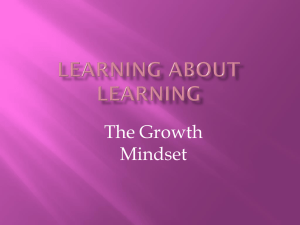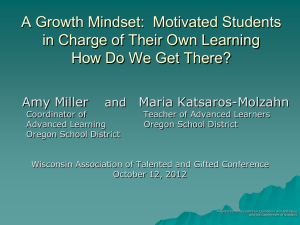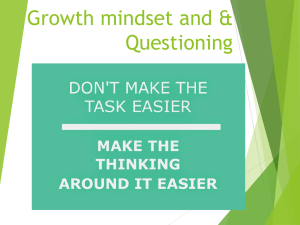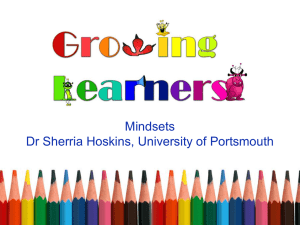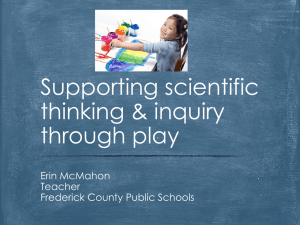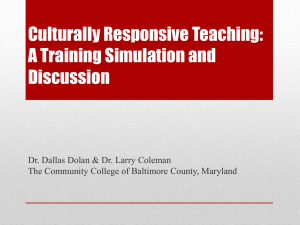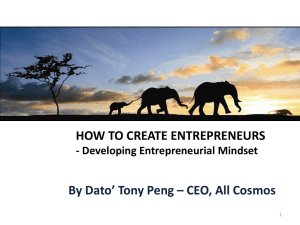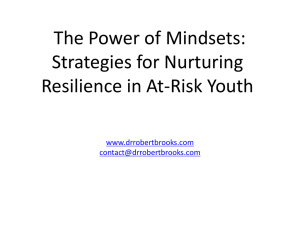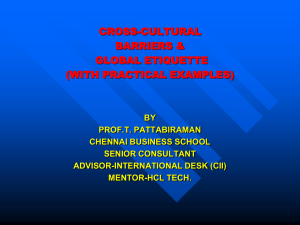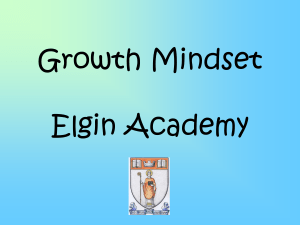Emotional Intelligence, Self Efficacy & Success
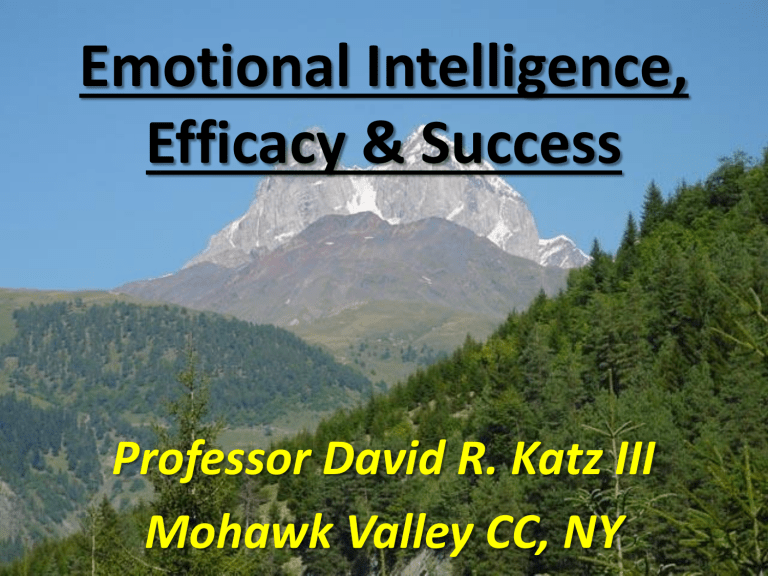
Emotional Intelligence,
Efficacy & Success
Professor David R. Katz III
Mohawk Valley CC, NY
Telling is not teaching!
Connection is key!
BIG THREE PREMISES
• We have a profound impact upon the emotional state of the people we interact with.
Create Resonance!
• We can improve people’s attitudes toward their work by how we relate to them.
Reinforce Strengths!
• We can encourage a mindset that leads to stronger selfefficacy & more persistent effort.
Growth Mindset!
IN SHORT
SUCCESS!
Emotional Impact of Leaders
(with every communication)
What leads to
RESONANCE
• Good feelings which free up their best, harmony.
• Connections which open communication.
• Positivism which supports mental clarity and productivity.
Activity
Emotional Impact of Leaders
(with every communication)
What leads to
DISSONANCE
• Anxious feelings and distress.
• Shut down which inhibits communication.
• Negativity which hampers clear thinking and productivity.
Activity
Emotional
Stability
• Open Loop System
• Dependent on
External Stimuli
• Relies on
Connections
To Others
• WWII_crying babies
The Contagion of Emotions
Angry Stressed Depressed Stern Pre-Occupied Condescending Detached =
DISSONANCE
Caring Friendly Empathetic Enthusiastic Positive Excited Laughing Smiles =
RESONANCE
WHICH EMOTIONS WILL THEY CATCH FROM US? SURVIVE OR THRIVE?
WILL WE LEAD OUR PEOPLE TOWARD DISSONANCE OR RESONANCE?
“Give them the face they need.”
Herb Sendek
Arizona State
Men’s Basketball
Breakout Activity
Outcomes of High Levels of
Resonance
• Engaged Colleagues/Students
• Improved Focus
• Reduced Absence
• Reduced Mistakes
• More Fun
• More Success
ROCKS QUIZ!
JOE COCKER
& SC in 1840!
What we & our students focus on develops a physical connection in our brains, and creates biologically, a selffulfilling prophecy.
X = ? & Stupid!
Focus on what a player can do.
Give them a role that maximizes their effectiveness.
Types of Employees or Students
Engaged – employees work with passion and feel a profound connection to their company. They drive the innovation and move the organization forward.
Not Engaged – employees are essentially “checked out.” They’re sleepwalking through their work day, putting time – but not energy or passion – into their work.
Actively Disengaged – employees aren’t just unhappy at work; they’re busy acting out their unhappiness.
Everyday these workers undermine what their engaged coworkers accomplish.
2004 Poll – Effect of Management Style on
Employee Engagement
100%
16%
80%
60%
40%
20%
55%
40%
57%
29%
0%
Total sample
Copyright © 2004 The Gallup Organization, Princeton, NJ. All rights reserved
.
2%
Ignored
22%
33%
45%
1%
38%
61%
Weakness focused
Strengths focused
Actively
Disengaged
Not Engaged
Engaged
Share the
1 to 7 rule!
Cory story.
ACTIVITY
A person’s beliefs about their ability influence their performance are responsive to environmental factors like: relationships, and teaching & management approaches and are predictive of the quality duration of their effort & persistence . (Perry, 2003)
17
Dr. Barbara
Frederickson’s
“Broaden and Build
Theory” explains that positive emotions expand cognition.
Breakout Activity
The Effect of Affect
College teaching focus is on cognitive domain
However……
The affective domain governs motivation, efficacy, confidence, resiliency, connection & learning .
Mindset Activity
Consider this Mindset formula:
Intelligence or Being Smart =
_____% Effort + _____% Ability
Activity
Fixed Mindset:
35% effort + 65% ability
Growth Mindset:
65% effort + 35% ability
Mindset
What We Believe About Intelligence
Matters!
“Given the right set of circumstances, almost any person can learn almost anything.”
Sandy Shugart, President
Valencia Community College
A Fixed Mindset Believes
• Intelligence is a fixed trait or endowment
• Learning comes easily to smart people
• Effort is a sign of low ability; more effort won’t be effective
“Now Bart, how many times have I told you, if it’s too hard, just quit!”
A Growth Mindset Believes
• Intelligence develops with time and effort.
• Difficult tasks can be overcome by more effort.
• Even smart people have to work hard to learn.
• 10,000 hours!
When Faced With Difficult Tasks
Fixed mindsets…
– give up more easily
– conclude they must not be smart enough
Growth mindsets…
– work harder, longer & smarter
– believe they can master the task eventually
“Genius is one percent inspiration and ninety-nine percent perspiration.”
Breakout
Thomas A. Edison
BIG THREE PREMISES
• We have a profound impact upon the emotional state of the people we interact with.
Create Resonance!
• We can improve people’s attitudes toward their work by how we relate to them.
Reinforce Strengths!
• We can encourage a mindset that leads to stronger selfefficacy & more persistent effort.
Growth Mindset!
One of the grandchildren asked,
"Grandfather, which wolf will win?"
Smiling, the elder placed his hand on the young girl’s shoulder and answered.
"The one you feed."
Thank You!
dkatz@mvcc.edu
